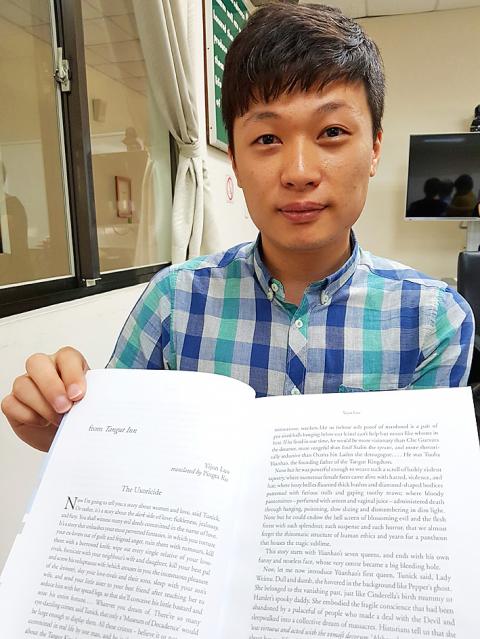Assistant professor Ku Ping-ta (辜炳達) has been awarded the PEN Presents - East and Southeast Asia award for his Chinese-to-English translation of Luo Yi-jun’s (駱以軍) Tangut Inn (西夏旅館).
Founded in 1921, English PEN is a London-based organization which aims to promote and defend freedom of expression in literature. Its translation awards aim to promote books from around the world to publishers.
Ku, 32, an adjunct assistant professor of English literature at National Taiwan University, was awarded £250 (US$321) for his translation of Luo’s first book, becoming the first non-native English speaker to be awarded the prize.

Photo: Wang Han-ping, Taipei Times
Tangut Inn is the first Chinese-language novel to win a Pen Presents award in Taiwan.
Ku’s decision to translate Tangut Inn in a style evocative of the Renaissance was inspired, the panel said.
The melange of literary styles used in the original work would have made it a challenging text to translate, it added.
Ku said he came to realize when he was doing his doctoral thesis that many Taiwanese novels could achieve international recognition if they were translated into English.
Luo is one of Taiwan’s best writers and deserves international recognition, Ku said, adding that Tangut Inn is one of his finest works.
To translate the novel, Ku said he contacted Luo through social media and met to convince him to authorize a translation.
Ku began the translation work after receiving a National Museum of Taiwan Literature grant in 2014.
Tangut Inn has 240,000 characters and Ku completed the translation last year, he said.
“My greatest concern was fidelity to the author’s text, but the panelists’ response tells me my worries were undue. Now my greatest concern is finding a publisher. A journal has picked up the translated work, which is in the British Library,” Ku said.
It is difficult to find translation work because non-native speakers are often overlooked, Ku said.
It is frustrating that in spite of accruing more than a decade of academic experience studying English literature, I am still considered a non-native English-language speaker, he added.
“I believe there is no shortage of good translators in Taiwan, but the nation’s publishing environment is not friendly toward translators overall,” Ku said.
Many publishers have a superstitious belief in foreigners’ ability to translate Chinese into other languages and the pay for translators is also significantly lower in Taiwan than in the US or the UK, he said.
Taiwanese publishers pay between NT$0.6 and NT$1 per word for English-to-Chinese translations, while US and UK publishing houses pay more than NT$4.5 per word, which makes working on long texts like Tangut Inn a daunting task, Ku said.
Taiwan’s universities do not treat translations as academic publications and academics have to wait until they are free of tenure fears before they can begin translating texts, Ku said.

Costa Rica sent a group of intelligence officials to Taiwan for a short-term training program, the first time the Central American country has done so since the countries ended official diplomatic relations in 2007, a Costa Rican media outlet reported last week. Five officials from the Costa Rican Directorate of Intelligence and Security last month spent 23 days in Taipei undergoing a series of training sessions focused on national security, La Nacion reported on Friday, quoting unnamed sources. The Costa Rican government has not confirmed the report. The Chinese embassy in Costa Rica protested the news, saying in a statement issued the same

Taiwan is to extend its visa-waiver program for Philippine passport holders for another year, starting on Aug. 1, Minister of Foreign Affairs Lin Chia-lung (林佳龍) said on Friday. Lin made the announcement during a reception in Taipei marking the 127th anniversary of Philippine independence and the 50th anniversary of the establishment of the Manila Economic and Cultural Office (MECO) in Taiwan, the Ministry of Foreign Affairs said. The decision reflected Taiwan’s commitment to deepening exchanges with the Philippines, the statement cited Lin as saying, adding that it was a key partner under the New Southbound Policy launched in 2016. Lin also expressed hope

Temperatures in New Taipei City’s Sindian District (新店) climbed past 37°C yesterday, as the Central Weather Administration (CWA) issued heat alerts for 16 municipalities, warning the public of intense heat expected across Taiwan. The hottest location in Taiwan was in Sindian, where the mercury reached 37.5°C at about 2pm, according to CWA data. Taipei’s Shilin District (士林) recorded a temperature of 37.4°C at noon, Taitung County’s Jinfeng Township (金峰) at 12:50 pm logged a temperature of 37.4°C and Miaoli County’s Toufen Township (頭份) reached 36.7°C at 11:40am, the CWA said. The weather agency yesterday issued a yellow level information notice for Taipei, New

CASE: Prosecutors have requested heavy sentences, citing a lack of remorse and the defendants’ role in ‘undermining the country’s democratic foundations’ Five people affiliated with the Chinese Nationalist Party (KMT), including senior staff from the party’s Taipei branch, were indicted yesterday for allegedly forging thousands of signatures to recall two Democratic Progressive Party (DPP) lawmakers. Those indicted include KMT Taipei chapter director Huang Lu Chin-ru (黃呂錦茹), secretary-general Chu Wen-ching (初文卿) and secretary Yao Fu-wen (姚富文), the Taipei District Prosecutors’ Office said in a news release. Prosecutors said the three were responsible for fabricating 5,211 signature forms — 2,537 related to the recall of DPP Legislator Wu Pei-yi (吳沛憶) and 2,674 for DPP Legislator Rosalia Wu (吳思瑤) — with forged entries accounting for